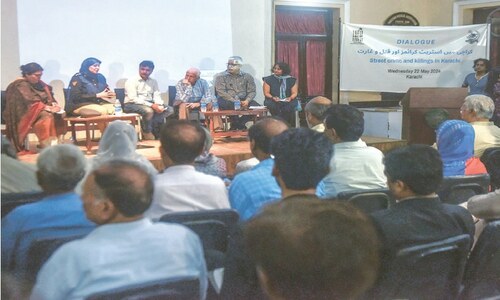IN the 1960s, Nazimabad had turned into one of the key middle- and upper-middle neighbourhoods in Karachi. Unlike localities, let’s say, like Lyari and Malir, it did not have a pre-partition history which could be taken into account while undertaking development work. It was already a ‘contemporary’ neighbourhood. The majority of residents, too, came from decent backgrounds, so it took the vicinity no time to get attention of the city authorities on a regular basis. A big number of houses in Nazimabad had recently been provided with sewerage connections, but there were still many that depended on soak pits which was why they constantly overflowed (with sewage). It was a major health issue. The Karachi Metropolitan Corporation (KMC) had been, for some time, imploring the residents to connect the sewers in their area with the mains, but it cut no ice with them.
On Jan 16, 1967 the KMC said it would prosecute landlords in Nazimabad who had failed to connect their sewerage lines with the mains within three months. Cases would be registered under the Municipal Health Act for creating unhygienic conditions detrimental to public health. There were 5,500 in the neighbourhood and 1,000 more in its adjoining areas that had not yet complied. Already, connections had been provided to a little over 4,000 houses and about 1,500 were still relying on soak pits.
Hygiene was something that all metropolitan bodies of the city took very seriously, as they should (especially today when Karachi is bursting at the seams). On Jan 20, at a meeting of the Landhi-Korangi Municipal Committee, chairman of the committee admitted that meat sold in both Landhi and Korangi was mostly unfit for human consumption. He reasoned that since there was no slaughterhouse run by the committee, butchers slaughtered animals at their own places without taking health-check measures. He asked the Karachi Development Authority (KDA) to give them a plot of land to be used as a slaughterhouse on a temporary basis until an abattoir was built in either Landhi or Korangi. Half a century ago, this was the level of considerateness on the part of our municipal functionaries.
The thing is that the citizen, too, trusted their elected representatives and those who were in government, because compared to the 21st century, back then the distance between the public and the people at the helm was not a yawning one. On Jan 21, West Pakistan Minister for Information and Finance Ahmed Saeed Kirmani invited the public to Governor House to hear their grievances and, if possible, redress them. Well, he got much more than what he had bargained for. More complainants turned up than he could deal with. Women wearing burqas huddled in the corridors of Governor House and small groups of men scattered on the lawns at 10am where the public session was to begin. By the time the minister arrived (at 11am), the crowd was nearly 500 strong and they kept pouring in. He was immediately surrounded by the complainants and leaders of the Muslim League.
Taking stock of the situation, he asked the crowd to make queues, one for collective problems and the other for individual issues. When Minister for Health and Social Welfare Begum Zahida Khaliquzzaman showed up at 11.15am there were so many men and women around her that she could only receive applications, saying all of them would be given a sympathetic consideration.
Imagine Governor House getting opened to the public in 2017!
Published in Dawn, January 16th, 2017














































Dear visitor, the comments section is undergoing an overhaul and will return soon.